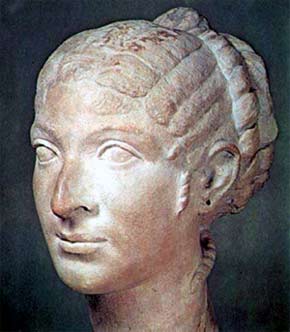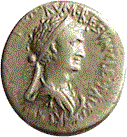

| bust
of the young Cleopatra [fair use image © MyMacedonia.net] |
Cleopatra VII Thea Philopator [69 - 30 BCE; suicide]
![]()
|
Daughter of Ptolemy
XII & Cleopatra V The final ruler from the house of Ptolemy became the most famous, due to the pivotal role she played in the tragic fate of two of Rome's most celebrated soldiers. While no raving beauty, her charm, wit & sheer intelligence gave her a personal magnetism that attracted admirers & repelled rivals. A gifted linguist, she was fluent in nine languages. As the only Macedonian ruler who bothered to learn to speak Egyptian, she was adored & worshipped by her subjects as a living goddess ("the new Isis"). She proved so successful in captivating strong men & getting them to please her that it was said that, next to Hannibal -- the Carthaginian who almost conquered Rome a century & a half earlier --, Cleopatra was the foreigner whom Romans feared most. For she almost succeeded in achieving through charm what Hannibal had failed to win with arms. The most remarkable aspect of Cleopatra's meteoric career is that it began at the nadir of Ptolemaic power. Though historically the strongest & wealthiest of eastern Mediterranean kingdoms, Egypt had been weakened by a century of internecine fighting, mismanagement of resources, & failed military ventures under Cleopatra's predecessors. Cleopatra's father had been so unpopular that Alexandrians deposed him (58 BCE) in favor of her oldest sister (Berenice IV) & regained his throne (55 BCE) only by buying the support of Rome's new rulers: the triumvirs, Pompey & Julius Caesar. Cleopatra was just 14 when her father executed his popular oldest daughter in retaliation for her acquiescence in this palace revolt. His second daughter, Cleopatra VI, may have escaped a similar fate by dying before her father's return. Had either of these Ptolemaic princesses lived, history may never have heard of Cleopatra VII. As it was, Cleopatra's father did not live to enjoy the benefits of the throne he had purchased with Egypt's wealth & his own daughter's blood. For he soon died (51 BCE), leaving his kingdom deeply in debt to Caesar & his surviving offspring the legal wards of Pompey. Thus, when Cleopatra VII (age 18) became queen, Egypt was no longer an autonomous power but a client kingdom under the "protection" of Roman military strongmen. While others in the Ptolemaic court were not prepared to accept that new Realpolitik, Egypt's young queen was not only astute enough to recognize where the real balance of power lay, but shrewd enough to try to leverage it to her own -- and her kingdom's -- advantage. Forced by ancient Egyptian custom to rule with a sibling consort, Cleopatra "married" her 12 year old brother (Ptolemy XIII). But it is unlikely that this "marriage" -- staged for public show -- was ever really consummated. Rather, it only led to an intense sibling rivalry that culminated in Cleopatra's exile from Egypt (48 BCE). For when she began to issue orders independently, senior court officials decided to evict her in the name of her more malleable brother, who relished the idea of being free from the shadow of his strong-willed big sister. So, less than three years after becoming queen, Cleopatra -- now 21 -- had not only lost her throne but her country. Yet, within months she regained both by using her wits & charm to emerge on top of volatile political events that shifted the balance of power in both Roman & Egyptian politics. Pompey, having been defeated by Caesar at Farsala (48 BCE), sought refuge in Alexandria from his former ward, Ptolemy XIII (now aged 15) only to be assassinated by the young Pharaoh's advisors. When Caesar arrived days later, Ptolemy fled but returned to try to persuade Caesar to recognize him as Egypt's sole ruler. Before he met Caesar, however, Cleopatra -- who had taken advantage of her brother's flight from Alexandria to return incognito -- arranged to have herself smuggled into Caesar's presence rolled up in some bedding (not the rug imagined in later depictions of this scene). When the impetuous young Ptolemy learned that Caesar -- who was captivated by Cleopatra's ingenuity -- had decided to restore the exiled queen as co-ruler, he stormed out & foolishly tried to incite the Alexandrian crowds against the Romans. Caesar took the young Pharaoh hostage, leading Ptolemy's advisors to lay siege to Alexandria. Though greatly outnumbered, Caesar's garrison kept control of the harbor; and, when reinforced, routed the besiegers. Ptolemy drowned trying to flee (47 BCE), leaving Cleopatra sole ruler of Egypt. Caesar may have intended to rule Egypt through its young queen, who owed her throne to him. But Cleopatra was not content to be used as a political puppet of Rome. Rather, she persuaded the seasoned dictator to take time to celebrate his victory by joining her on a leisurely cruise up the Nile. When Caesar left Egypt (47 BCE), Cleopatra gave birth to the old soldier's only son, whom she named Caesarion. The next year she took the child to Rome, where Caesar publicly acknowledged his paternity & had a gold statue of Cleopatra installed in the temple of his family's patron goddess, Venus Genetrix. In just two years, Cleopatra had gone from exile to implicit deification in Rome & public recognition as mother of the logical heir of the most powerful man in the Mediterranean world. Caesar's assassination (44 BCE) by Roman senators who feared the "dictator for life" intended to restore a hereditary monarchy in Rome itself dealt Cleopatra's political ambitions a severe blow. Neither she nor her son were named in Caesar's will. So the Macedonian love goddess slipped out of Italy without fanfare & returned to safe haven in Alexandria as Rome -- with the rest of the Mediterranean world -- was plunged into two years of civil war between Caesar's heirs & his assassins. To secure at least the throne of Egypt for Caesar's son, Cleopatra had her nominal consort -- her fifteen year old youngest brother, Ptolemy XIV -- assassinated (43 BCE) & proclaimed the 4 year old Caesarion her co-regent. The next year, when Caesar's stepson Octavian -- the dictator's legal heir -- had the Roman Senate declare Caesar a god (42 BCE) to claim divine authority for himself, it gave Cleopatra a propaganda weapon that she could use to claim the divine right of Caesar's natural son. But, to support such a claim, first she had to win the favor of Octavian's only viable rival: Caesar's lusty lieutenant, Marc Antony. Widely known for bouts of drunken promiscuity, Antony had recently become the sober Octavian's brother-in-law. But when Antony -- fresh from victory over Caesar's assassins (42 BCE) -- commanded Cleopatra to come to Tarsus (Asia Minor) to answer charges that she had aided the assassin, Cassius, he was easily seduced. Rather than appear at the dictate of the Roman victor, the now 28 year old queen who had charmed Antony's former commander into restoring her throne, took time to prepare for a grand entrance designed to disarm the latter's crude aide-de-camp. Arriving clad as Venus on a gold-decked barge, with purple sails & silver oars, Cleopatra so awed Antony that he was easily lured to Alexandria for a winter-long vacation of wreckless luxurious living as her lover (41-40 BCE). Though the next spring he returned to his wife in Rome, Cleopatra bore him twins (Alexander & Cleopatra), who were later characterized as the sun god (Helios) & moon goddess (Selene). The allure of such memories was addicting to Antony. After four years of less than idyllic political & domestic life in Rome, he rejoined Cleopatra (36 BCE) & granted her control over Cyprus & much of Syria & Palestine. Thus, areas that Cleopatra's Ptolemaic ancestors had long claimed but had frequently lost to rivals were returned to Egyptian control without the cost of a single battle. Such was Cleopatra's power. Only the kingdom of Judea (except for the balsam groves at Jericho) -- which was ruled by Antony's longtime ally, Herod -- was safe from Cleopatra's plans to gain control of the whole Levant. Cleopatra in return agreed to fund Antony's grandiose campaigns against Parthia (36 BCE) & Armenia (35 BCE). The former, which might have given Rome control of most of Alexander's empire instead turned into a humiliating Roman defeat. Antony, however, returned triumphant from Armenia. To celebrate his victory, Cleopatra staged an elaborate ceremony in Alexandria (34 BCE) in which Antony joined her on a golden throne, publicly proclaiming her as "Queen of Kings" & Caesar's son Caesarion as "King of Kings" (a title that no one had claimed since Alexander). Cleopatra probably orchestrated this pretentious celebration as a public challenge to Octavian's claims to be rightful heir of the deified Caesar. But this time she miscalculated. For Octavian skillfully used it to marshal Roman opinion to attack Antony before he & Cleopatra replaced the Roman republic with an Alexandria-based monarchy. Octavian's fleet, under the command of Marcus Agrippa, engaged the combined fleets of Antony & Cleopatra in a brutal battle at Actium (31 BCE). When Cleopatra suddenly decided to save her galleys by retreating, Antony followed & the battle was lost. Rather than suffer the humiliation of capture, Antony committed suicide. When Cleopatra realized that she could not succeed in seducing Octavian as she had his step-father & former ally, she followed suit. Arrayed as Isis -- the Egyptian goddess of life beyond death --, she reportedly courted the bite of an asp, which ancient Egyptians believed conveyed immortality. In Cleopatra's case, at least, her flare for staging such dramatic entrances & exits insured her survival in the western imagination for millennia to come. References:
Josephus,
Antiquities
14.324, 375-376; Other resources on line:
|
![]()
 |
|
![]()
![]()
![]() Perspective on the
World of Jesus
Perspective on the
World of Jesus ![]()
Copyright © 1999-2023
by
Mahlon H. Smith
All rights reserved.
an American Theological
Library Association Selected Religion Website
OCLC catalog no.: 62046512